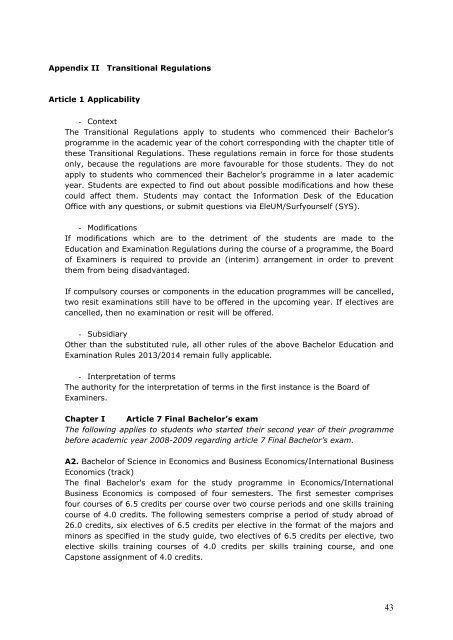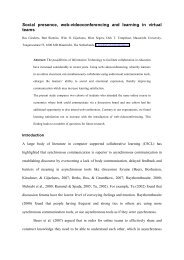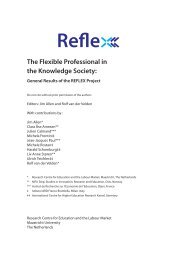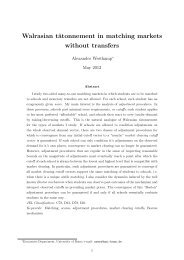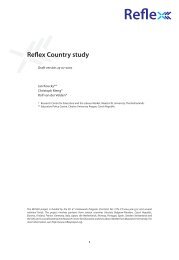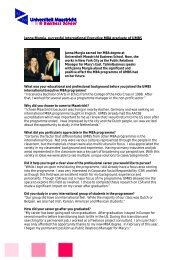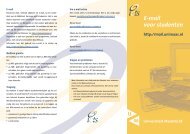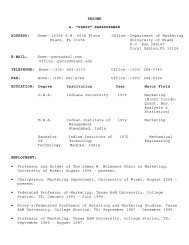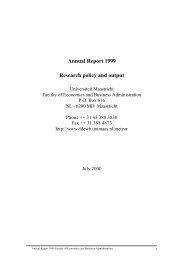Bachelor EER (OER) 2013-2014 DRAFT - School of Business and ...
Bachelor EER (OER) 2013-2014 DRAFT - School of Business and ...
Bachelor EER (OER) 2013-2014 DRAFT - School of Business and ...
You also want an ePaper? Increase the reach of your titles
YUMPU automatically turns print PDFs into web optimized ePapers that Google loves.
Appendix II Transitional Regulations<br />
Article 1 Applicability<br />
- Context<br />
The Transitional Regulations apply to students who commenced their <strong>Bachelor</strong>’s<br />
programme in the academic year <strong>of</strong> the cohort corresponding with the chapter title <strong>of</strong><br />
these Transitional Regulations. These regulations remain in force for those students<br />
only, because the regulations are more favourable for those students. They do not<br />
apply to students who commenced their <strong>Bachelor</strong>’s programme in a later academic<br />
year. Students are expected to find out about possible modifications <strong>and</strong> how these<br />
could affect them. Students may contact the Information Desk <strong>of</strong> the Education<br />
Office with any questions, or submit questions via EleUM/Surfyourself (SYS).<br />
- Modifications<br />
If modifications which are to the detriment <strong>of</strong> the students are made to the<br />
Education <strong>and</strong> Examination Regulations during the course <strong>of</strong> a programme, the Board<br />
<strong>of</strong> Examiners is required to provide an (interim) arrangement in order to prevent<br />
them from being disadvantaged.<br />
If compulsory courses or components in the education programmes will be cancelled,<br />
two resit examinations still have to be <strong>of</strong>fered in the upcoming year. If electives are<br />
cancelled, then no examination or resit will be <strong>of</strong>fered.<br />
- Subsidiary<br />
Other than the substituted rule, all other rules <strong>of</strong> the above <strong>Bachelor</strong> Education <strong>and</strong><br />
Examination Rules <strong>2013</strong>/<strong>2014</strong> remain fully applicable.<br />
- Interpretation <strong>of</strong> terms<br />
The authority for the interpretation <strong>of</strong> terms in the first instance is the Board <strong>of</strong><br />
Examiners.<br />
Chapter I Article 7 Final <strong>Bachelor</strong>’s exam<br />
The following applies to students who started their second year <strong>of</strong> their programme<br />
before academic year 2008-2009 regarding article 7 Final <strong>Bachelor</strong>’s exam.<br />
A2. <strong>Bachelor</strong> <strong>of</strong> Science in Economics <strong>and</strong> <strong>Business</strong> Economics/International <strong>Business</strong><br />
Economics (track)<br />
The final <strong>Bachelor</strong>'s exam for the study programme in Economics/International<br />
<strong>Business</strong> Economics is composed <strong>of</strong> four semesters. The first semester comprises<br />
four courses <strong>of</strong> 6.5 credits per course over two course periods <strong>and</strong> one skills training<br />
course <strong>of</strong> 4.0 credits. The following semesters comprise a period <strong>of</strong> study abroad <strong>of</strong><br />
26.0 credits, six electives <strong>of</strong> 6.5 credits per elective in the format <strong>of</strong> the majors <strong>and</strong><br />
minors as specified in the study guide, two electives <strong>of</strong> 6.5 credits per elective, two<br />
elective skills training courses <strong>of</strong> 4.0 credits per skills training course, <strong>and</strong> one<br />
Capstone assignment <strong>of</strong> 4.0 credits.<br />
43


